Related Research Articles

Fascism is a far-right, authoritarian, ultranationalist political ideology and movement, characterized by a dictatorial leader, centralized autocracy, militarism, forcible suppression of opposition, belief in a natural social hierarchy, subordination of individual interests for the perceived good of the nation or race, and strong regimentation of society and the economy. Opposed to anarchism, democracy, pluralism, egalitarianism, liberalism, socialism, and Marxism, fascism is placed on the far-right wing within the traditional left–right spectrum.

The Weimar Republic, officially known as the German Reich, was a historical period of Germany from 9 November 1918 to 23 March 1933, during which it was a constitutional federal republic for the first time in history; hence it is also referred to, and unofficially proclaimed itself, as the German Republic. The period's informal name is derived from the city of Weimar, which hosted the constituent assembly that established its government. In English, the republic was usually simply called "Germany", with "Weimar Republic" not commonly used until the 1930s.
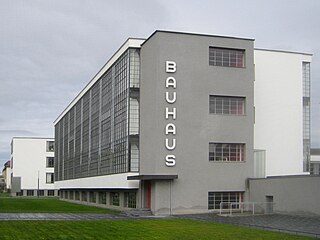
Weimar culture was the emergence of the arts and sciences that happened in Germany during the Weimar Republic, the latter during that part of the interwar period between Germany's defeat in World War I in 1918 and Hitler's rise to power in 1933. 1920s Berlin was at the hectic center of the Weimar culture. Although not part of the Weimar Republic, some authors also include the German-speaking Austria, and particularly Vienna, as part of Weimar culture.
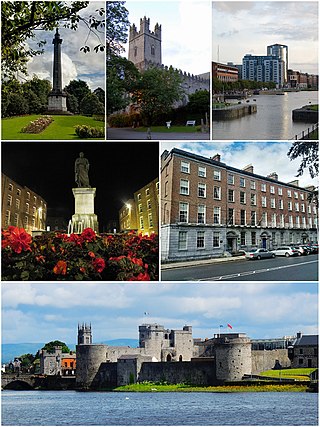
Limerick is a city in western Ireland, in County Limerick. It is in the province of Munster and is in the Mid-West which comprises part of the Southern Region. With a population of 102,287 at the 2022 census, Limerick is the third-most populous urban area in the Republic of Ireland, and the fourth-most populous city on the island of Ireland. It was founded by Scandinavian settlers in 812, during the Viking Age.

The Kapp Putsch, also known as the Kapp–Lüttwitz Putsch, was an attempted coup against the German national government in Berlin on 13 March 1920. Named after its leaders Wolfgang Kapp and Walther von Lüttwitz, its goal was to undo the German Revolution of 1918–1919, overthrow the Weimar Republic, and establish an autocratic government in its place. It was supported by parts of the Reichswehr, as well as nationalist and monarchist factions.

Heinrich Aloysius Maria Elisabeth Brüning was a German Centre Party politician and academic, who served as the chancellor of Germany during the Weimar Republic from 1930 to 1932.
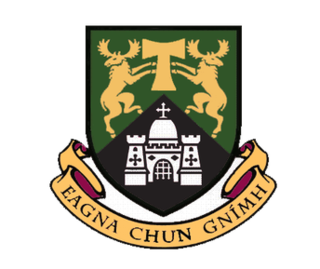
University of Limerick (UL) is a public research university institution in Limerick, Ireland. Founded in 1972 as the National Institute for Higher Education, Limerick, it became a university in September 1989 in accordance with the University of Limerick Act 1989. It was the first university established since Irish independence in 1922, followed by the establishment of Dublin City University.
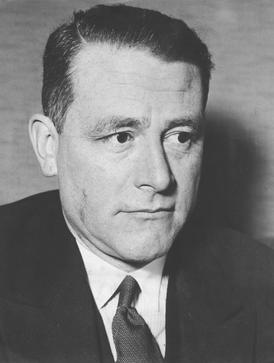
Carl Schmitt was a German jurist, political theorist, geopolitician and prominent member of the Nazi Party.

The Völkisch movement was a German ethnic nationalist movement active from the late 19th century through the dissolution of the German Reich in 1945, with remnants in the Federal Republic of Germany afterwards. Erected on the idea of "blood and soil", inspired by the one-body-metaphor, and by the idea of naturally grown communities in unity, it was characterized by organicism, racialism, populism, agrarianism, romantic nationalism and – as a consequence of a growing exclusive and ethnic connotation – by antisemitism from the 1900s onward. Völkisch nationalists generally considered the Jews to be an "alien people" who belonged to a different Volk from the Germans.
Henry Armand Giroux is an American-Canadian scholar and cultural critic. One of the founding theorists of critical pedagogy in the United States, he is best known for his pioneering work in public pedagogy, cultural studies, youth studies, higher education, media studies, and critical theory. In 2002, Keith Morrison wrote about Giroux as among the top fifty influential figures in 20th-century educational discourse.

In the history of the 20th century, the interwar period lasted from 11 November 1918 to 1 September 1939 – from the end of World War I (WWI) to the beginning of World War II (WWII). It was relatively short, yet featured many social, political, military, and economic changes throughout the world. Petroleum-based energy production and associated mechanisation led to the prosperous Roaring Twenties, a time of social and economic mobility for the middle class. Automobiles, electric lighting, radio, and more became common among populations in the first world. The era's indulgences were followed by the Great Depression, an unprecedented worldwide economic downturn that severely damaged many of the world's largest economies.
The Conservative Revolution, also known as the German neoconservative movement, or new nationalism, was a German national conservative movement prominent during the Weimar Republic and Austria, in the years 1918–1933.

German nationalism is an ideological notion that promotes the unity of Germans and of the Germanosphere into one unified nation-state. German nationalism also emphasizes and takes pride in the patriotism and national identity of Germans as one nation and one people. The earliest origins of German nationalism began with the birth of romantic nationalism during the Napoleonic Wars when Pan-Germanism started to rise. Advocacy of a German nation-state began to become an important political force in response to the invasion of German territories by France under Napoleon Bonaparte.
Sonderweg refers to the theory in German historiography that considers the German-speaking lands or the country of Germany itself to have followed a course from aristocracy to democracy unlike any other in Europe.
Jeffrey C. Herf is an American historian of modern Europe, particularly modern Germany. He is Distinguished University Professor, of modern European history, Emeritus at the University of Maryland, College Park.
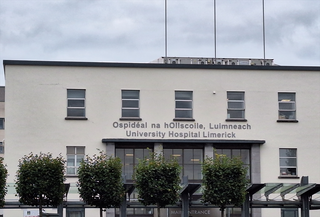
University Hospital Limerick is a Level 4 hospital located in Dooradoyle, Limerick, Ireland. It is managed by UL Hospitals Group.

The Majority Social Democratic Party of Germany was the name officially used by the Social Democratic Party of Germany (SPD) between April 1917 and September 1922. The name differentiated it from the Independent Social Democratic Party, which split from the SPD as a result of the party majority's support of the government during the First World War.
Isa Blumi is a historian. He is a senior lecturer and associate professor of Turkish Studies at Stockholm University Institute for Turkish Studies in Sweden.
Matthew Potter is an Irish academic who serves as the current curator of Limerick Museum. He is a published historian with a primary focus on governmental history and is an Honorary Fellow of the Department of History of the University of Limerick.
This is a list of selected papers or books about the Holocaust in Greece.
References
- ↑ VIAF
- ↑ "Emeritus Prof. Anthony McElligott | University of Limerick". www.ul.ie. 4 March 2024. Retrieved 24 July 2024.
- ↑ https://networks.h-net.org/node/22277/pages/41555/anthony-mcelligott-biography
- ↑ "Professor Anthony McElligott, MRIA, FRHistS | UL History". www.ul.ie. Retrieved 12 April 2021.
- ↑ https://go.gale.com/ps/anonymous?id=GALE%7CA126119809&sid=googleScholar&v=2.1&it=r&linkaccess=fulltext&issn=00472441&p=AONE&sw=w Joachim Whaley Date: Dec. 2004 From: Journal of European Studies(Vol. 34, Issue 4) Publisher: Sage Publications Ltd. (UK)
- ↑ Jerram, Leif. "Anthony McElligott (ed.), The German Urban Experience, 1900–1945: Modernity and Crisis . Routledge Sources in Modern History. London: Routledge, 2001. xii + 295pp. £19.99 pbk". Urban History. 30 (3): 435–436. doi:10.1017/S0963926804421695.
- ↑ Jones, Larry Eugene. "Rethinking the Weimar Republic: Authority and Authoritarianism, 1916–1936, by Anthony McElligott". The English Historical Review. 130 (545): 1038–1040. doi:10.1093/ehr/cev151.
- ↑ Lieberman, Benjamin (2015). "Rethinking the Weimar Republic: Authority and Authoritarianism, 1916–1936 . By Anthony McElligott. (London, England: Bloomsbury Academic, 2014. Pp. xi, 372. $120.00.)". The Historian. 77 (4): 843–844. doi:10.1111/hisn.12077_61.
- ↑ "Rethinking the Weimar Republic: Authority and Authoritarianism, 1916-1936 | Reviews in History". reviews.history.ac.uk.
- ↑ Jensen, Erik (2016). "Anthony McElligott, Rethinking the Weimar Republic: Authority and Authoritarianism, 1916–1936". European History Quarterly. 46 (4): 762–764. doi:10.1177/0265691416658234ae.